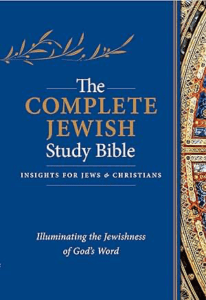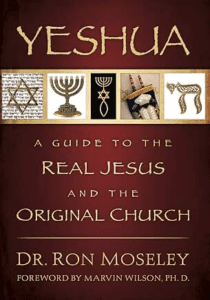
Hebrew Roots Foundations
There are a few foundational ideas that make up the basics of the Hebrew Roots perspective – Jesus didn’t abolish the Law (Matt 5:17), Christians are grafted into the faith (Romans 11), and the Law is a blessing and given for our benefit (Romans 7:12 and others). Once you see and understand these concepts, you won’t be able to un-see them! These are fundamental concepts throughout the Old and New Testament and understanding them will be a blessing to your faith-walk and provide much in the way of biblical context.
As we Hebrew Roots Christians understand the Torah (or Law) as being a righteous and good thing, we also understand that it does not save us. Our salvation comes from grace alone through the sacrifice of Jesus the Messiah. We’re to rejoice in the Law because God gave it for our benefit. Following it allows us to live the way God intended and it sets us apart from the world. Imagine how humankind would be living if we didn’t have any instruction from God!
The Law Remains
One of the key foundations of the Hebrew Roots perspective comes from the teaching of Jesus himself during the Sermon on the Mount. This is the only recorded sermon that Jesus gave, and it’s very powerful.
In Matthew chapter 5, Jesus clarifies:
17 Do not think that I came to abolish the Law or the Prophets; I did not come to abolish but to fulfill. 18 For truly I say to you, until heaven and earth pass away, not the smallest letter or stroke shall pass from the Law until all is accomplished. 19 Whoever then annuls one of the least of these commandments, and teaches others to do the same, shall be called least in the kingdom of heaven; but whoever keeps and teaches them, he shall be called great in the kingdom of heaven.
Matt 5:17-19 (NASB)

The Law that Jesus is speaking of is the Torah given to Moses by God on Mount Sinai. Jesus is reminding everyone that the Torah is not being abolished, at least not until heaven and earth is gone. The Greek for the word fulfill in verse 17 is pleroo. If you look up the definition of pleroo in the Strong’s Concordance, you’ll see that it means something a little different than how it’s commonly translated.
When someone fulfills their duty, it generally means they’re done. For example, when Azeem fulfills his vow at the end of Robin Hood: Prince of Thieves, it means he’s done, and can now relax and return home. But the definition of pleroo is different. Its meanings include “to make full”, “to fill up”, “to consummate”, or “to complete”.
These definitions are all quite different then what we typically understand as “fulfill”. None of the definitions of pleroo means to “end” and this is important to understand. Using the word fulfill in verse 17 does a disservice to Christians and provides a source of error among believers because many people interpret fulfill to mean the same as end or abolish. This causes many to interpret this verse as “Do not think that I came to abolish the Law or the Prophets; I did not come to abolish but to abolish” which is certainly not correct.
It is much better to use the word complete in this context as in “Do not think that I came to abolish the Law or the Prophets; I did not come to abolish but to complete.” You can see that this is much more consistent with the rest of Jesus’s teaching.
In context, Jesus then continues in his Sermon on the Mount where he doesn’t abolish the Law, but affirms it. Not only does the Law say not to murder, but this includes not being angry with your brother as well (Matt 5:21-22). The Law says you are not to commit adultery, and Jesus explains that this includes lusting wrongly after a woman. (Matt 5:27-28). By affirming the Law of Moses, Jesus is not abolishing the Law, but completing it, just as he said in Matt 5:17.
These teachings by Jesus are some of the primary reasons why many who embrace the Hebrew Roots perspective question the doctrine of abolition of the Law. Looking back on Verse 19 above and we will notice the warning Jesus provides against teaching disobedience to the law:
19 Whoever then annuls one of the least of these commandments, and teaches others to do the same, shall be called least in the kingdom of heaven; but whoever keeps and teaches them, he shall be called great in the kingdom of heaven.
Matt 5:19 (NASB)
In fact, a few chapters later, Jesus offers a second warning against practicing disobedience to the law. In (Matthew 7:21-23) it is written:
21 Not everyone who says to Me, ‘Lord, Lord,’ will enter the kingdom of heaven, but he who does the will of My Father who is in heaven will enter. 22 Many will say to Me on that day, ‘Lord, Lord, did we not prophesy in Your name, and in Your name cast out demons, and in Your name perform many miracles?’ 23 And then I will declare to them, ‘I never knew you; depart from Me, you who practice lawlessness.’
Matt 7:21-23 (NASB)
Jesus was certainly not a fan of disobeying the Torah, which makes sense as he was a Jewish Rabbi, along with being the Son of the God who established the Law for us.
As a Christian, this should make you pause for a moment and think about what this means to the Christian faith. If we take Jesus at his word, and he didn’t abolish the law, then our walk needs to look a lot different.
Christians are Grafted in
The second concept that’s profound to the Hebrew Roots Movement, and Christians in general, comes from the teachings of the Apostle Paul. We Christians are Gentiles, so many denominations assume that means we have different rules than Jewish believers, like Jesus and Paul. Paul clears this up in Romans 11 where he explains that Gentiles are grafted into the faith like a wild olive tree grafted into a cultivated olive tree. We are not a separate tree, we’re grafted into the tree that exists, therefore inheriting the promises that God has made to biblical Israel.
16 If the first piece of dough is holy, the lump is also; and if the root is holy, the branches are too. 17 But if some of the branches were broken off, and you, being a wild olive, were grafted in among them and became partaker with them of the rich root of the olive tree, 18 do not be arrogant toward the branches; but if you are arrogant, remember that it is not you who supports the root, but the root supports you.
Romans 11:16-18
Paul understood that Christians were not of a separate religion, but that both Jews and Gentiles were one in Messiah. I think it is translated best in the Complete Jewish Bible:
27 because as many of you as were immersed into the Messiah have clothed yourselves with the Messiah, in whom 28 there is neither Jew nor Gentile, neither slave nor freeman, neither male nor female; for in union with the Messiah Yeshua, you are all one. 29 Also, if you belong to the Messiah, you are seed of Avraham and heirs according to the promise.
Galatians 3:27-29 (CJB)
Read our article on being grafted in to find out more details about Paul’s teaching.
The Torah (AKA the Law)
Have you ever asked yourself why God gave us the Law? Was the Law just a collection of rules that made life unnecessarily hard for everyone, showing us we can never live up to God’s expectations, or was it instructions from God Himself as to how people can live a righteous life? The Hebrew Roots perspective affirms the latter and we try to understand and embrace the Law as a holy and righteous gift from God. If you read through the bible with an understanding that the Law is a gift from God and those who have it are blessed, then it can really change the meaning of the verses. Some supporting verses are below.
In Romans 7:7-12 Paul explains that the function of the Torah is to inform us what sin is. Because the Torah says “Thou shalt not covet,” Paul then understands what greed is. However, Paul found that sin held more power after knowing the commandments. He explained that the law that was intended to bring him life was instead bringing him death because of the powerful pull of sin. If it’s difficult to understand the powerful pull of sin, count yourself blessed then go pick up a newspaper. You’ll quickly see both the draw and effect sin has on all of us.
Paul then concludes with the following:
12 So then, the Law is holy, and the commandment is holy and righteous and good.
Romans 7:12 (NASB)
Sin is bad, but the Torah is good.
Some further supporting verses are below:
24 So the Lord commanded us to observe all these statutes, to fear the Lord our God for our good always and for our survival, as it is today. 25 It will be righteousness for us if we are careful to observe all this commandment before the Lord our God, just as He commanded us.
Deut 6:24-25
28 Be careful to listen to all these words which I command you, so that it may be well with you and your sons after you forever, for you will be doing what is good and right in the sight of the Lord your God.
Deut 12:28
26 See, I am setting before you today a blessing and a curse: 27 the blessing, if you listen to the commandments of the Lord your God, which I am commanding you today; 28 and the curse, if you do not listen to the commandments of the Lord your God, but turn aside from the way which I am commanding you today, by following other gods which you have not known.
Deut 11:26-28
7 You shall consecrate yourselves therefore and be holy, for I am the Lord your God. You shall keep My statutes and practice them; I am the Lord who sanctifies you.
Lev 20:7
3 For this is the love of God, that we keep His commandments; and His commandments are not burdensome.
1 John 5:3
Defining Sin
One of the differences that Hebrew Roots Christians have is how we define sin. I find it interesting that in all the years I’ve been a Christian I’ve never seen sin defined. Torah means direction, instruction, or law. Sin on the other hand means to miss the mark or do something incorrectly. If there’s a way of living that’s wrong, we should strive to know what’s a right, or righteous, way to live. It’ll be extremely valuable for us to make a quick list of what is sin and what is not. We need to know specifically what’s prohibited for us, otherwise we Christians end up doing whatever we feel.
For example, is gossip an actual sin, and if so, why? How about sexual immorality? Different Christian denominations will answer this question differently. In fact, there is a fast growing group that believes all commandments have been done away with, and every act that a Christian may want to do is acceptable.
The book of 1 John explains succinctly what sin is:
4 Everyone who practices sin also practices lawlessness; and sin is lawlessness.
1 John 3:4
And lawlessness is when we don’t follow the commandments written in the Law. Why don’t we? Well, we often don’t even know what’s written in the Law. At some point scholars of the Old testament counted the commandments that God handed down and found 613 of them. Some are for women, some for men, many are for priests and courts, and some are only valid when there’s a functioning Temple in Jerusalem. 613 commandments is a lot more than I ever thought there was, but many of them you’ll find familiar.
Here are a few Laws you likely agree with, but may not have known them to be actual commands:
Do not Gossip
16 ‘You shall not go about as a slanderer among your people…
Lev 19:16a
Love Your Neighbor as Yourself
18 …but you shall love your neighbor as yourself; I am the LORD.
Lev 19:18b
Do not be superstitious or engage in Astrology
26 ‘You shall not eat anything with the blood, nor practice divination or soothsaying.
Lev 19:26
Or how about these?
Do not stand by if someone’s life is in danger.
16 …and you are not to act against the life of your neighbor; I am the LORD.
Lev 19:16b
Do not kill a murderer before he stands trial
12 … the manslayer will not die until he stands before the congregation for trial.
Num 35:12b
Immoral Sexual relations are Forbidden
5 You are to observe my laws and rulings; if a person does them, he will have life through them; I am ADONAI. 6 “‘None of you is to approach anyone who is a close relative in order to have sexual relations; I am ADONAI…
(continues through the rest of Leviticus 18)
Lev 18:5-30 (CJB)
One thing’s for sure, if you follow these commandments of God, you’ll certainly look different from the world – set apart – and what Christian doesn’t want that?
Again, as Christians, we understand that we’re not saved through obedience to the Law, but through the sacrifice of Jesus the Messiah and our faith in him. Even so, it is right for us to follow God’s commandments.
Understanding that the Law is still in effect, that Christians are grafted into the faith, and that the Law is a blessing given for our benefit will greatly strengthen your faith. The Law is so often mentioned in the bible, yet we easily forget how central it is to our faith. It’s what sets us apart and makes us different from the world.
If these perspectives are new to you (as it was for me for many years) or if you’re convicted to dig deeper into these concepts, here are a few resources you may find helpful.
Messianic Judaism 101 – This is a 6 part series put on by Rabbi Hershberg from Beth Yeshua International. If you like forwardness and conviction, you will enjoy these sermons.
Old Testament Bible Studies – From Tom Bradford’s Torah Class. This will provide more insightful information about the Old Testament then you will find anywhere.
New Testament Bible Studies – Also from Tom Bradford’s Torah Class. This is an amazing study, and you will learn so much.







Leave a Reply